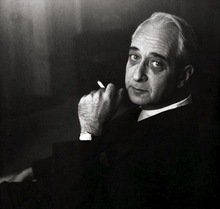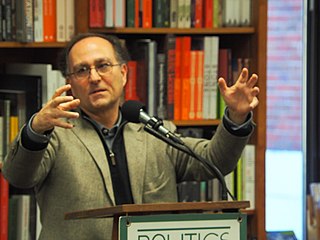Related Research Articles
Postmodern philosophy is a philosophical movement that arose in the second half of the 20th century as a critical response to assumptions allegedly present in modernist philosophical ideas regarding culture, identity, history, or language that were developed during the 18th-century Enlightenment. Postmodernist thinkers developed concepts like difference, repetition, trace, and hyperreality to subvert "grand narratives", univocity of being, and epistemic certainty. Postmodern philosophy questions the importance of power relationships, personalization, and discourse in the "construction" of truth and world views. Many postmodernists appear to deny that an objective reality exists, and appear to deny that there are objective moral values.

Hannah Arendt was a political philosopher, author, and Holocaust survivor. She is widely considered to be one of the most influential political theorists of the 20th century.

Richard McKay Rorty was an American philosopher. Educated at the University of Chicago and Yale University, he had strong interests and training in both the history of philosophy and in contemporary analytic philosophy. Rorty had a long and diverse academic career, including positions as Stuart Professor of Philosophy at Princeton University, Kenan Professor of Humanities at the University of Virginia, and Professor of Comparative literature at Stanford University. Among his most influential books are Philosophy and the Mirror of Nature (1979), Consequences of Pragmatism (1982), and Contingency, Irony, and Solidarity (1989).
Neoconservatism is a political movement that was born in the United States during the 1960s among liberal hawks who became disenchanted with the increasingly pacifist foreign policy of the Democratic Party and with the growing New Left and counterculture of the 1960s, particularly the Vietnam protests. Some also began to question their liberal beliefs regarding domestic policies such as the Great Society. Neoconservatives typically advocate the promotion of democracy and interventionism in international affairs, including peace through strength, and are known for espousing disdain for communism and political radicalism.

Henry Steele Commager (1902–1998) was an American historian. As one of the most active and prolific liberal intellectuals of his time, with 40 books and 700 essays and reviews, he helped define modern liberalism in the United States.

Lionel Mordecai Trilling was an American literary critic, short story writer, essayist, and teacher. He was one of the leading U.S. critics of the 20th century who analyzed the contemporary cultural, social, and political implications of literature. With his wife Diana Trilling, whom he married in 1929, he was a member of the New York Intellectuals and contributor to the Partisan Review.

Social philosophy examines questions about the foundations of social institutions, social behavior, and interpretations of society in terms of ethical values rather than empirical relations. Social philosophers emphasize understanding the social contexts for political, legal, moral and cultural questions, and the development of novel theoretical frameworks, from social ontology to care ethics to cosmopolitan theories of democracy, natural law, human rights, gender equity and global justice.

Abdolkarim Soroush (عبدالكريم سروش Persian pronunciation: [æbdolkæriːm soruːʃ]; born Hossein Haj Faraj Dabbagh, is an Iranian Islamic thinker, reformer, Rumi scholar, public intellectual, and a former professor of philosophy at the University of Tehran and Imam Khomeini International University. He is arguably the most influential figure in the religious intellectual movement of Iran. Soroush is currently a visiting scholar at the University of Maryland in College Park, Maryland. He was also affiliated with other institutions, including Harvard, Princeton, Yale, Columbia, the Leiden-based International Institute as a visiting professor for the Study of Islam in the Modern World and the Wissenschaftskolleg in Berlin. He was named by Time magazine as one of the world's 100 most influential people in 2005, and by Prospect magazine as one of the most influential intellectuals in the world in 2008. Soroush's ideas, founded on relativism, prompted both supporters and critics to compare his role in reforming Islam to that of Martin Luther in reforming Christianity.
Alfred Kazin was an American writer and literary critic. He wrote often about the immigrant experience in early twentieth century America.

Carl Lotus Becker was an American historian of the Age of Enlightenment in America and Europe.
David Riesman was an American sociologist, educator, and best-selling commentator on American society.
Articles in social and political philosophy include:
Liberalism is a political and moral philosophy based on the rights of the individual, liberty, consent of the governed and equality before the law. Liberals espouse various views depending on their understanding of these principles. However, they generally support private property, market economies, individual rights, liberal democracy, secularism, rule of law, economic and political freedom, freedom of speech, freedom of the press, freedom of assembly, and freedom of religion. Liberalism is frequently cited as the dominant ideology of modern times.

Richard Jacob Bernstein was an American philosopher who taught for many years at Haverford College and then at The New School for Social Research, where he was Vera List Professor of Philosophy. Bernstein wrote extensively about a broad array of issues and philosophical traditions including American pragmatism, neopragmatism, critical theory, deconstruction, social philosophy, political philosophy, and hermeneutics.
The Committee for Cultural Freedom (CCF) was an American political organization active from 1939 to 1951 which advocated opposition to the totalitarianism of both the Soviet Union and Nazi Germany in foreign affairs, and promoted pro-democratic reforms in public and private institutions domestically. Co-founded by influential philosopher and educator John Dewey and the anti-Soviet Marxist academic Sidney Hook, it was reorganized in January 1951 into the American Committee for Cultural Freedom.

Robert B. Talisse is an American philosopher and political theorist. He is currently Professor of Philosophy and Chair of the Philosophy Department at Vanderbilt University in Nashville, Tennessee, where he is also a Professor of Political Science. Talisse is a former editor of the academic journal Public Affairs Quarterly, and a regular contributor to the blog 3 Quarks Daily, where he posts a monthly column with his frequent co-author and fellow Vanderbilt philosopher Scott Aikin. He earned his PhD in Philosophy from the City University of New York in 2001. His principal area of research is political philosophy, with an emphasis on democratic theory and liberalism.

The Oasis is a short satirical novel by the American writer Mary McCarthy, published by Random House in 1949. McCarthy describes this, her second novel, as a "conte philosophique". It tells the story of a group of embattled intellectuals, their quest to establish a Utopian community in the mountains of New England, and their failure to surmount ideological and personal differences for the greater good of the commune. Doubling as a roman à clef, The Oasis borrows heavily from McCarthy's experiences and frustrations with the short lived European-American Group, and serves more broadly as a critique of the “abstract idealism of intellectuals” and their inability to enact actual change.
The Liberal Imagination: Essays on Literature and Society (1950) is a collection of sixteen essays by American literary critic Lionel Trilling, published by Viking in 1950. The book was edited by Pascal Covici, who had worked with Trilling when he edited and introduced Viking's Portable Matthew Arnold in 1949. With the exception of the preface, which was written specifically for the publication of the book, all the essays included in The Liberal Imagination were individually published in the decade before the book's publication in literary and critical journals, such as The Partisan Review, The Kenyon Review, The Nation, and The American Quarterly. The essays represent Trilling's written work and critical thoughts of the 1940s.
Edmund Fawcett is a British political journalist and author. He worked at The Economist (1973–2003) as chief correspondent in Washington, Paris, Berlin and Brussels, as well as European and literary editor. In a long career covering international politics, he wrote about the growth of the European Union, democratisation in Spain, Portugal and Greece, the end of the Cold War, new hopes for the United Nations, Germany's unification and the wars in ex-Yugoslavia. In the United States, he travelled widely, followed three presidential campaigns and wrote about the decline of detente in the late 1970s together with the rise of Reaganism. His frequent book reviews have appeared in The New York Times, Guardian and New Statesman, Times Literary Supplement and Political Quarterly.
The successor ideology is a term devised by essayist Wesley Yang to describe an emergent ideology within left-wing political movements in the United States centered around intersectionality, social justice, identity politics, and anti-racism, which is supposedly replacing conventional liberal values of pluralism, freedom of speech, color blindness, and free inquiry. Proponents of the concept link it to an alleged growth in the intolerance of differing opinions, to cancel culture, "wokeness," "social justice warriors", and to the far left; Yang himself describes it bluntly as "authoritarian Utopianism that masquerades as liberal humanism while usurping it from within."
References
- ↑ McGowan, J. (2007). American Liberalism: An Interpretation of Our Time. Chapel Hill, NC: North Carolina University Press.
- ↑ "McGowan's web-site at UNC" . Retrieved 2008-01-09.
- ↑ McGowan, John. "Public Intelligence".